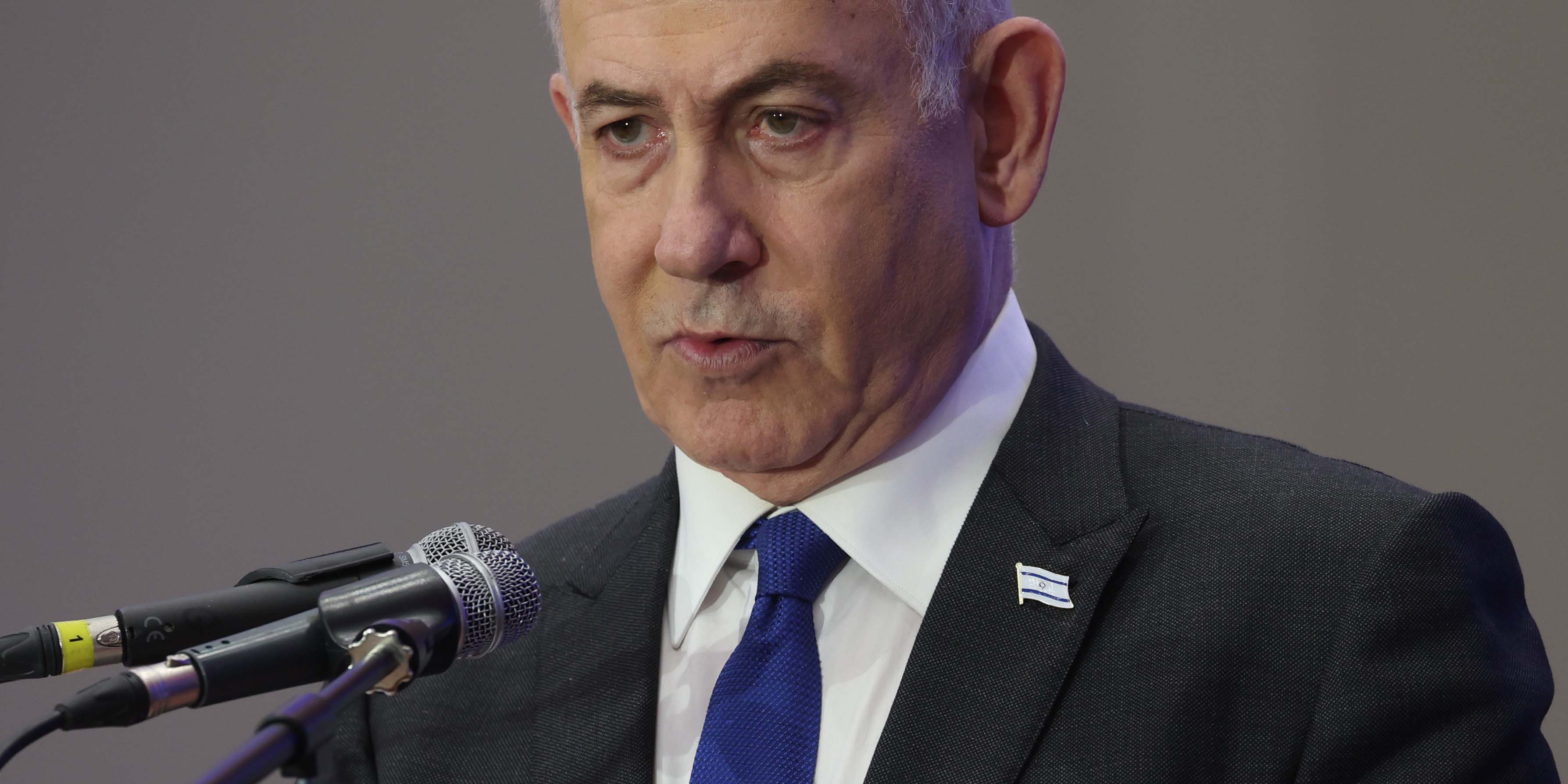Chief executives from major companies including Palantir Technologies and Oracle met senators at the Capitol on Tuesday to press for US support of Israel amid its invasion of Gaza, while seeking a way to release hostages held by Hamas.
McGill University, one of Canada’s top schools, has given up on negotiating a resolution with pro-Palestinian protesters who’ve been camped on its south lawn for more than 50 days and plans to pursue court action against them instead.
Netanyahu tells US: ‘Give us the tools and we’ll finish the job’
Israeli Prime Minister Benjamin Netanyahu said the US must keep supplying weapons for its war against Hamas, accusing President Joe Biden of withholding arms as the country was “fighting for its life”.
In an English-language video statement released on Tuesday, Netanyahu said he told US Secretary of State Anthony Blinken during his visit to Israel last week that he appreciated Washington’s support but that it was “inconceivable” any weapons or ammunition had been withheld in the past few months.
“During World War 2, Churchill told the United States: ‘Give us the tools, we’ll do the job,’” Netanyahu said. “And I say, give us the tools and we’ll finish the job a lot faster.’”
The US has become increasingly critical of Israel’s offensive in the Gaza Strip to root out Hamas, the group designated a terrorist organisation by the US and European Union that killed more than 1,200 Israelis and abducted more than 250 on 7 October, triggering the ongoing war. More than 37,000 Palestinians have been killed, according to the Hamas-run Gaza health ministry, which doesn’t differentiate between combatants and civilians.
Biden has withheld one shipment of 2,000-pound bombs to signal his frustration and said last month that he would halt additional shipments of offensive weapons if the country launched a full-scale ground invasion of Rafah. Israeli tanks were reported to have reached the centre of the town on 28 May, in what the military called a limited and precise set of operations.
Read more: Israel pauses combat on road in Gaza to allow for more aid
Netanyahu didn’t specify if more weapons or ammunition had been withheld by the US, Israel’s biggest arms supplier.
Blinken, speaking in Washington later on Tuesday, said a review was ongoing on that one shipment of bombs but that “everything else is moving as it normally would move”. US officials have also said privately that Israel has enough weapons for its Rafah campaign, as well as additional stockpiles if the conflict in the north with Hezbollah escalates.
The Israeli leader said Blinken had assured him the administration was working “day and night” to remove any bottlenecks.
Two key Democratic holdouts in the House and Senate signed off on a major arms sale to Israel, including 50 F-15 fighter jets valued at more than $18-billion, following pressure from the White House and pro-Israel advocates, The Washington Post reported on Tuesday.
Palantir, Oracle, Pfizer CEOs lobby US senators on Israel, hostages
Chief executives from major companies including Palantir Technologies and Oracle met senators at the Capitol on Tuesday to press for US support of Israel amid its invasion of Gaza, while seeking a way to release hostages held by Hamas.
Palantir’s Alexander Karp, Oracle’s Safra Catz and Pfizer’s Albert Bourla were among the executives at the meeting with a bipartisan group of senators including Democrat Cory Booker of New Jersey and Republican Lindsey Graham of South Carolina.
Senator John Cornyn, a Texas Republican, said the meeting also touched on how countries such as Saudi Arabia could play a role in a post-Hamas Gaza.
Graham said the CEOs pressed for a focus on releasing the hostages, but he said Israel wouldn’t accept a deal that left Hamas in charge.
McGill ends talks with protesters who’ve occupied campus for seven weeks
McGill University, one of Canada’s top schools, has given up on negotiating a resolution with pro-Palestinian protesters who’ve been camped on its south lawn for more than 50 days and plans to pursue court action against them instead.
President Deep Saini said the university’s latest bid to end the encampment peacefully was rejected by protest organisers. The Montreal-based institution had offered “limited disciplinary amnesty” to students and staff who have participated in the encampment, which began on the last weekend in April.
In an email, Saini said it had become clear that “no fruitful outcome” would result from talks with the protesters.
“The university will pursue disciplinary processes against individuals participating in the encampment to the full extent outlined in our policies,” he wrote, without giving specifics. McGill may also pursue legal action for damages, he said.
The university tried and failed for a court injunction against the encampment last month, and is scheduled to try again in July.
Encampment organisers have adopted a strategy of escalation in recent weeks. On 31 May, protesters targeted a building donated by Israeli-Canadian philanthropist Sylvan Adams. The planned sports science institute, which is still under construction, was briefly occupied. Organisers called on their supporters to “dismantle this site by any means necessary.”
On 6 June, protesters entered an administration building and took over a third-floor office, leading to a confrontation with police outside and multiple arrests. In his letter, Saini referred to other “unacceptable incidents”, such as the targeting of staff at their homes and the hanging of an effigy of Netanyahu.
McGill will voluntarily take some actions that protesters want, including exploring whether it should divest from weapons manufacturers and increasing its disclosure of smaller investments. The university already reveals any direct equity and fixed-income holdings above C$500,000 ($364,000), Saini wrote. DM
Read more in Daily Maverick: Middle East crisis news hub





